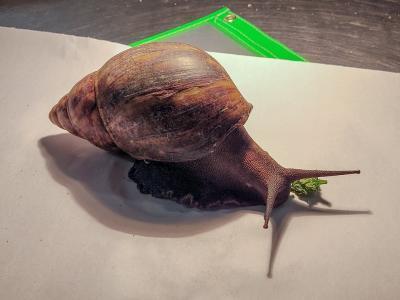
Caption
This Giant African Snail was intercepted by Customs and Border Protection at Hartsfield-Jackson International Airport.
Credit: U.S. Customs and Border Protection
|Updated: November 17, 2022 11:11 AM
K-9 teams at Hartsfield-Jackson International Airport detected a Giant African Snail in passenger luggage this week. Customs and Border Protections agriculture specialists work with a team of beagles to identify pests or prohibited foods.

This Giant African Snail was intercepted by Customs and Border Protection at Hartsfield-Jackson International Airport.
The U.S. Department of Agriculture classifies the Giant African Snail as an invasive species. The mollusks cause extensive damage in tropical and sub-tropical environments like most of the southern U.S. since the snail consumes over 400 types of plants.
CBP Supervisor Agriculture Specialist Arrisia Sims said the agency is focused on preventing the spread of diseases.
“With African snails, we have potential meningitis,” Sims said. “With monkey meat we have concerns of AIDS. It can be transmittable. So there are a different number of species where we not only work with USDA, we work with Fish and Wildlife, but we also work with the [Centers for Disease Control and Prevention].”
Sims said unregulated food such as bush meat and cane rat or diseases like citrus cankers could infect and devastate local food production. Travelers caught with undeclared prohibited food or animals face hefty fines.
CPB agricultural specialists and K-9s are trained to work together to inspect international luggage and shipments that may contain invasive insects, federally banned plant species, and plant and animal diseases.